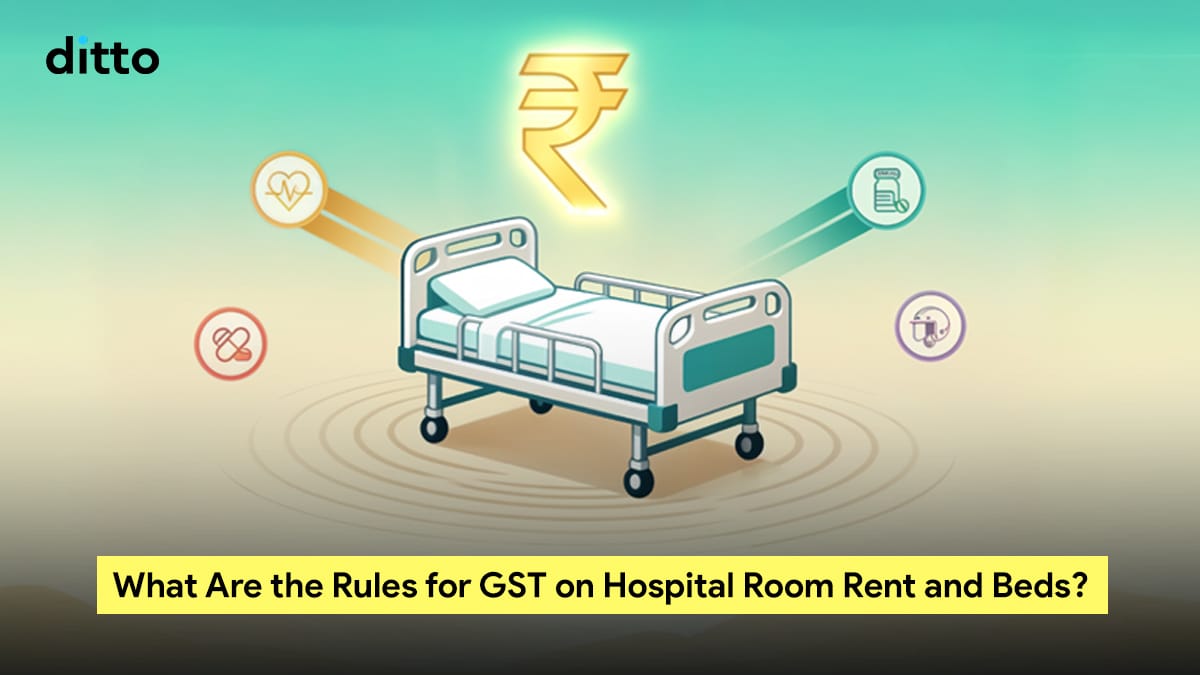Key Takeaways
The Goods and Services Tax (GST) system in India has specific provisions impacting hospital room rents and related healthcare services. Since July 18, 2022, a 5% GST applies to non-ICU hospital rooms where rent exceeds ₹5,000 per day, while ICU and critical care rooms remain fully exempt.
Understanding these rules is crucial for patients, insurers, and healthcare providers to navigate medical billing transparently and optimize insurance claims.
In this article, Ditto unpacks the key GST regulations for hospital room rent and beds in 2025, highlighting exemptions, GST calculation methods, impacts on patients and insurers, and how ITC (Input Tax Credit) applies. We at Ditto are here to help you navigate hospital billing, GST, and insurance decisions with confidence.
Friendly reminder: It’s easy to get lost comparing policies and premiums. Instead of spending hours on it, why not get personalized insurance advice from Ditto? We offer free consultations with zero spam! Just 30 minutes to clarify all your doubts. So book a call now.
How is GST Calculated on Hospital Room Rent?
GST applies at a rate of 5% (2.5% CGST + 2.5% SGST) only on non-ICU hospital room rent exceeding ₹5,000 per day. If the room rent is ₹6,000, for example, GST will be ₹300 (5% of ₹6,000). This tax is charged only on the room rent portion separately indicated on the hospital bill. Other healthcare services such as diagnostics, treatment, and medicines provided as part of inpatient care remain GST-exempt, provided they are not sold separately.
Calculation Steps:
- Check if the daily room rent exceeds ₹5,000.
- GST is levied on the entire hospital room rent amount when the non-ICU room exceeds ₹5,000 per day, not just on the portion above ₹5,000.
- Add this GST to the total hospital bill.
Exemptions for GST on Hospital Room Rent
While the Goods and Services Tax (GST) now applies to certain hospital room rents, not all medical or hospital-related services fall under its ambit. The government has retained several exemptions to ensure that essential and life-saving healthcare services remain affordable and accessible. Here’s a clear breakdown of what remains GST-free:
1. ICU / CCU / ICCU / NICU Rooms: All room rents in Intensive Care Units (ICU), Critical Care Units (CCU), Intensive Cardiac Care Units (ICCU), and Neonatal Intensive Care Units (NICU) are fully exempt from GST, irrespective of the tariff or hospital type.
2. Non-ICU Rooms up to ₹5,000 per Day: Non-ICU hospital rooms priced up to ₹5,000 per day are exempt from GST. Only non-ICU rooms with a daily rent exceeding ₹5,000 attract 5% GST, with no input tax credit (ITC) available to hospitals to offset it against other expenses.
3. Bundled Inpatient Healthcare Services (Composite Supply): When hospitals provide medicines, implants, consumables, diagnostics, and food as part of a comprehensive inpatient treatment package, it is treated as a composite supply of healthcare services. Such bundled services are exempt from GST, as reaffirmed by multiple Advance Ruling Authorities and CBIC clarifications.
4. Ambulance Services: The transportation of patients by ambulance, when provided by or on behalf of a clinical establishment, is explicitly exempt from GST under the official notification.
5. Healthcare Services by Accredited Providers: Services involving diagnosis, treatment, or care delivered by clinical establishments, registered medical practitioners, or paramedics are exempt from GST. This covers both OPD and IPD care, across hospitals and clinics, except for cosmetic or aesthetic procedures unless medically necessary (e.g., due to burns or trauma).
7. Biomedical Waste Treatment: While biomedical waste treatment services supplied to hospitals are taxed at 12%, this applies only to business-to-business (B2B) transactions. Patients do not bear this cost directly, as it forms part of hospital operational expenses.
Note:
- Cosmetic or aesthetic surgery is taxable unless medically required (e.g., post-trauma, burns).
- Outpatient retail pharmacy sales are taxed at the applicable medicine/device GST rate, as the exemption is for healthcare services, not for the sale of physical goods to walk-in customers.
Impact of GST on Patients and InsurersThe recent GST rules on hospital room rent have important implications for both patients and insurers, influencing treatment costs, insurance claims, and out-of-pocket expenses.
For Patients
- Non-ICU room rent ≤ ₹5,000/day: No GST
- Non-ICU room rent > ₹5,000/day: 5% GST on room rent only.
- ICU, CCU, ICCU, NICU rooms: Fully GST-exempt.
- Core healthcare services always exempt: Consultations, nursing, diagnostics, medical procedures.
- Inpatient care items exempt: Medicines, implants, consumables, meals.
- Outpatient pharmacy sales: GST applies.
For Insurers
1.) Reimbursement claims: Patient pays full bill first, then gets reimbursed based on policy.
2.) If hospital charges exceed limits: Extra room rent and GST must be paid by the patient.
3.) Cashless claims: GST on eligible room rent usually covered within policy limits.
The GST on hospital room rent mainly affects patients opting for higher-cost, non-ICU rooms, as it slightly increases their treatment expenses. At the same time, the government has retained exemptions for core healthcare services, including ICU care, diagnostics, and inpatient treatment bundles, to avoid burdening essential medical care.
How to Claim Input Tax Credit (ITC) for Hospital Room Rent?
Under the current GST framework, no party- hospitals, patients, or insurers can claim input tax credit (ITC) on the GST charged for non-ICU hospital room rent above ₹5,000 per day. Here’s how it works for each group:
Key Rules
1. Hospitals: No ITC Permitted:
When hospitals charge 5% GST on non-ICU room rent exceeding ₹5,000 per day, the tax is explicitly marked “without ITC” under Entry 31A of Notification No. 03/2022–Central Tax (Rate). This means hospitals cannot claim credit for any input goods or services (like medical supplies, maintenance, or utilities) used to provide those rooms.
2. Patients and Policyholders:
Patients are generally not registered under GST. Even in rare cases where they are, Section 17(5)(b) of the CGST Act specifically blocks ITC on health-related services unless the recipient is engaged in supplying the same category of service. So in practice, patients cannot claim ITC on any hospital expenses, including room rent.
3. Insurers:
Health or group insurers also cannot claim ITC on GST paid for hospital room rent because they are not the direct recipients of that service; the patient is. Even when insurers pay hospital bills under cashless claims, ITC remains blocked under Section 17(5)(b). Recent clarifications allowing ITC on insurance commissions do not extend to hospital room rent or medical services.
Why Talk to Ditto for Health Insurance?
At Ditto, we’ve assisted over 8,00,000 customers with choosing the right insurance policy. Why customers like Abhinav below love us:

- No-Spam & No Salesmen
- Rated 4.9/5 on Google Reviews by 15,000+ happy customers
- Backed by Zerodha
- 100% Free Consultation
You can book a FREE consultation here. Slots are running out, so make sure you book a call now.
Ditto’s Take on GST on Hospital Room Rent and Beds
While the new GST charges may not directly impact medical insurance policyholders, they can indirectly influence future premiums. When the overall cost of hospitalization increases due to the 5% GST on non-ICU rooms above ₹5,000 per day, claim amounts also rise. To account for these higher payouts, insurers may adjust premiums upward.
For new buyers, it’s advisable to choose policies that do not have room rent limits, such as HDFC Ergo’s Optima Secure, Care Supreme, Aditya Birla Activ One Max, Niva Bupa ReAssure 2.0 Titanium+, etc, to avoid paying a proportionate share of hospital expenses out of pocket. Always read the policy document carefully and understand the terms and conditions before purchasing coverage.
This 5% GST on higher room rents marks a notable policy change, modestly increasing hospital stay costs. However, core healthcare services such as ICU treatment, bundled inpatient services, and medicines remain GST-exempt, helping preserve affordability for essential care.
Informed policyholders can mitigate the GST impact through the right plan selection, ensuring that room rent limits and claim processes align with the latest tax rules. Ditto helps you navigate these nuances, offering free expert consultations to optimize your health coverage and minimize unexpected out-of-pocket expenses.
Ultimately, understanding how GST applies selectively empowers both patients and insurers to plan more effectively, balancing affordability with comprehensive protection.
Frequently Asked Questions (FAQs)
Who will pay the GST amount?
The patient pays the GST amount, either upfront or through insurance claims. Insurers usually cover GST on room rent within policy limits.
Is GST applicable to all types of hospital beds?
No. GST applies only to non-ICU room rent above ₹5,000/day. ICU, CCU, ICCU, and NICU beds are exempt.
Is GST charged only on the amount above ₹5,000?
No. Kindly note that if the daily room rent exceeds ₹5,000, a 5% GST is applied to the entire room rent for that day.
Do shared wards (per-bed charges) attract GST?
GST is applicable only if the per-patient daily charge for a non-ICU bed exceeds ₹5,000. Otherwise, it is exempt.
Can GST on hospital room rent be reimbursed by insurance?
Yes, insurance covers GST on admissible room rent in cashless claims, subject to policy caps. For reimbursement claims, GST can be claimed if the room rent charges are eligible under the policy.
How does GST affect hospital billing transparency?
Hospitals must clearly separate room rent and applicable GST on bills. This transparency ensures patients know the exact GST charged and can claim insurance accordingly.
Last updated on:










